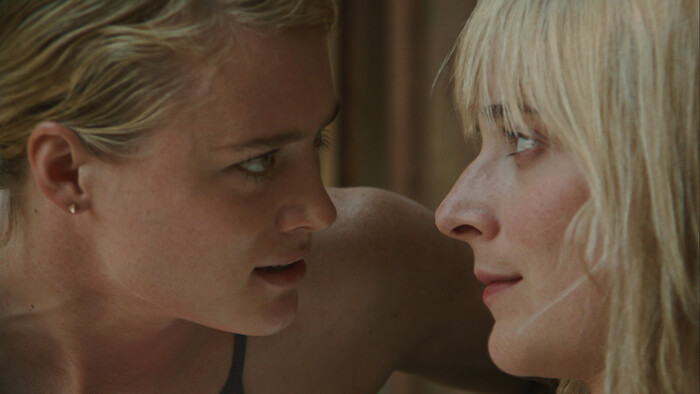Friendship Is Dark Magic: Always Shine


Always Shine
Directed by Sophia Takal
Opens November 25 at the Village East
Always Shine casts the psychologies of female friendship in a Persona-inspired shade, with varying results. The film concerns best friends Anna (Mackenzie Davis) and Beth (Caitlin Fitzgerald), both blonde haired, blue-eyed actresses with a long history behind them that the film never delves into. The two women go to spend a weekend together at a secluded California house, and tensions mount, eventually reaching an ominous end. Director Sophia Takal, who started as an actress, likely brings some of her own industry experience to this story of female jealousy, and creates a tense atmosphere using jarring, mysterious cuts. The film isn’t necessarily horror, but the opening scene, in which Beth auditions for a bad horror movie (of course the casting director mentions nudity), the editing, and the secluded setting all cleverly suggest the genre. Beth is considerably more successful than Anna and the two women have one uncomfortable interaction after another. While female friendship can be a source of joy, it can also be uniquely cruel, and Always Shine understands this truth well. Sometimes the dialogue starts to verge on camp: “Do you ever feel like a whore?” Anna asks Beth, as Beth complains about the nudity expected in far too many of her roles.
This is not a good girl/bad girl friendship, though it may initially appear that way with Beth’s appearance of being somewhat more gentle while Anna is caustic. The changes in the women’s behaviors are easy to predict. Anna’s jealousy of Beth is understandable, but so too is Beth’s frustration with Anna’s jealousy. The scenes that are meant to shock just build on this dynamic, taking it slightly past the usual parameters. Astute viewers won’t be surprised when Anna appears standing behind Beth as Beth complains on the phone to her boyfriend, though one senses the moment is meant to scare. Anna’s angry nature is revealed too obviously in an early scene in which she curses while on the phone with a credit card company. We are made to expect her to break down for the whole film, without it happening organically.
Nudity is frequently discussed but little seen—Takal seems most interested in creating a kind of psychological nakedness. While this goal is admirable, particularly when it comes to a story of young blonde women whose acting careers are so steeped in vapidity (Beth’s primary source of income is an appearance in a beer commercial), it sometimes feels that there is something missing. One might wish to see a bit more of just how they got to this tense place, how they navigated the tricky waters of their industry. In the insular, deceptively sunny world of Always Shine female friendship is dangerous, sure, but its depiction could use a bit more nuance.
You might also like 


























